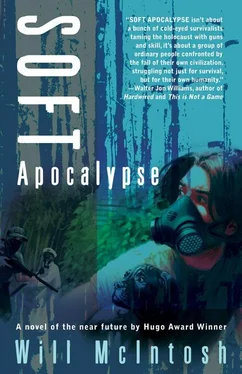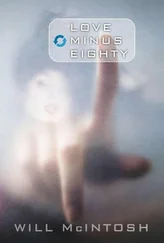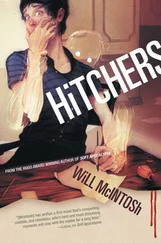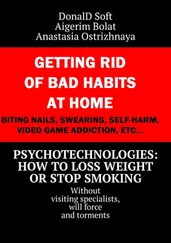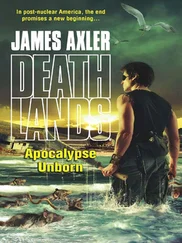“Five minutes till your first date,” a mellifluous female voice informed me from out of the sky. I wondered if women heard a man’s voice.
“Mirror, please,” I said, and checked to make sure I didn’t have a piece of dandruff dangling from one of my eyebrows. Everything was shiny and perfect inside the VR environment except us daters—exact replication of what you had was all you got.
“Thank you.” The mirror disappeared. Mirrors aren’t good things to have around on blind dates; the process makes you self-conscious enough.
In the air to my left, my first date’s vitals appeared, along with the lie-detector readout, currently flatlined. Her name was Maura (though that didn’t mean much; lots of women didn’t give their real names to minimize the lunatic stalker factor). She was thirty-six, a physician, lived in Trenton. Liked Fuzz-Jazz and Postal music, and freerunning. I took a few deep breaths, readying myself for thirty-eight three-minute dates.
Maura materialized in the chair across the table. She had bushy brows and a pointy chin. Long, thin nostrils that you couldn’t help but see into when you looked at her. Kind of aristocratic looking. Interesting.
“Hi Jasper. I have a few questions that I like to ask, then if you want you can ask me questions.” She talked fast, but with three minutes that was par.
“Sounds fine,” I said. Suddenly my nose itched; I resisted scratching it. Scratching, or any sort of face-touching for that matter, doesn’t convey the best first impression.
“How many times have you cheated on a wife or girlfriend?”
I gawked at her. She had to be joking. What kind of an opening question was that?
“Less than twelve,” I finally said.
She looked at me the way my grade school teachers used to when I was being bad and I knew it.
“Is your salary statement accurate?”
“Sometimes.” It wasn’t like my salary was all that impressive. If I was going to lie, I would have done better than what was listed. Maybe what she was asking was, “What are you doing here, given your pitiful salary? You’re obviously a poor downtowner.”
“Do you have any bizarre sexual interests?”
“Define bizarre.”
I knew her type. She’d had some bad dating experiences and now she focused more on what she didn’t want than what she did want. Avoidance dating. She was already angry with me for the thoughtless things I would potentially do if we dated.
When she finished I asked her a few questions: Have you ever stolen a shopping cart from a grocery store? What’s your favorite Drowned Mermaids song? You don’t know the Drowned Mermaids? Hmm. That could be a problem. I pretended to jot a note; she didn’t seem to realize I was being sarcastic. Maura faded away. I scratched my nose with a vengeance.
Next was Victoria. She was too fat: big and boxy—a rectangle over disproportionately skinny legs. As we talked I chided myself for being shallow, then I snapped back at the chiding voice: attraction matters; it’s not the only thing that matters, but it matters, and I’m not going to pretend it doesn’t matter to satisfy my less-than-attractive female acquaintances, who don’t want it to matter. A girlfriend had to be reasonably attractive, or at least reasonably attractive to me. I found gangly women with overbites terribly attractive. Also nerdy women—shy, socially awkward librarian types really did it for me.
When Victoria faded I downloaded her bio-video out of courtesy. I probably wouldn’t watch it, but she seemed nice and I didn’t want to hurt her feelings. A few seconds later she downloaded mine as well.
The next woman materialized, interrupting my reverie. She was in a wheelchair.
The first time I’d done this speed-dating thing, I’d figured the difficult part would be trying to seem clever and kind and confident, all in the space of three minutes. But the truly difficult part was masking disappointment and disinterest.
For the third time today, I struggled to keep a stiff smile pasted on my face as we danced through the “nice to meet yous.”
From the rubbery, slight movement of greeting she made with her hand, Maya was a victim of Polio-X, that top 40 dial-a-virus that swept the nation in ’23. She had some nerve, I thought, getting on a dating service, inflicting us with guilt for rejecting her because she had a disability. Then I got hold of my irrational lizard brain and realized how incredibly unfair that was. She wasn’t twisting anyone’s arm. But there was no way I could be with her. A wheelchair was just too much baggage. I was not the sacrificing type, willing to wipe a woman’s butt if that’s what she needed. It just wasn’t me. Maybe I’m not giving and self-sacrificing enough to ever have a truly successful relationship. At least I was honest about it.
“So you’re an economist?” I said, seeking a polite topic that would pass the time, while hopefully conveying that I thought she was interesting, but that I wasn’t interested. “Any insights to offer on the current state of affairs? When do you think the market’s going to turn around?” Not that I had a dime to invest in the market.
“Wow, that’s kind of a personal question, don’t you think?” Her voice dripped sarcasm—she saw what I was doing, and was calling me on it.
I laughed uncomfortably.
“It’s not going to turn around,” she said. “It’s going to get worse, and then it’s going to collapse completely.”
I laughed uncomfortably again.
“You think I’m kidding,” she said.
“It’s got to turn around eventually.”
“No it doesn’t,” she said. “It didn’t for the dinosaurs.”
“Okay,” I said. Next she’d probably tell me about the end of days, and ask if I’d made my peace with Jesus Christ.
“I can see you don’t believe me,” she said, gesturing toward the lie-detector, not unkindly.
“It’s not a question of believing. I can see you believe what you’re saying, and I’m sure you’re good at what you do, but how sure can you be about something like this? Honestly?”
“Every Nobel Prize-winning economist who’s still alive is sure of it,” she said. “The economy is slowly collapsing. Remember all those dire warnings about global warming, overpopulation, resource depletion, the rain forest, nuclear fallout, save the whales? Any of that ring a bell?”
“Uh huh,” I said mildly. I’d evidently picked the wrong topic. How much time did I have left with her? One minute, forty-six seconds.
“They weren’t kidding. Billions of people are going to die before this is over.” She gestured at my lie-detector readout with her chin. I looked at it. Ninety-seven percent honesty. Not even a hint of exaggeration. Billions of people, she said. It was the same estimate that Sebastian had given, back when he was convincing people to make our lives even more miserable by planting voracious bamboo.
She had an interesting face. Big, wide mouth showing lots of teeth—what I’d always thought of as a shark-mouth—and scary light blue eyes, like see-through gossamer fabric draped over sky. If it wasn’t for the wheelchair. Well, if it wasn’t for the wheelchair she’d be out of my league. I suppose if I was okay with the wheelchair, it would be one of those reasonable tradeoffs that we all pretend don’t really enter into love and relationships: she settles for a somewhat immature, big-nosed, skinny guy, and I get a woman who is more attractive than I could reasonably have hoped for, but in a wheelchair, with arms and legs that were mostly useless.
“Why haven’t they warned people?” I asked, not really wanting to hear the answer, but needing to say something because I’d been silent for three or four seconds.
She laughed. “They’ve been shouting it from the rooftops for years! There was an article in the New York Times just a few weeks ago. Nobody listens to academics. Smart is passé.”
Читать дальше
